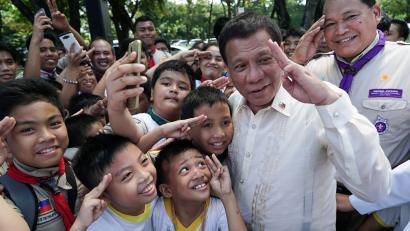PATRICK POLESHUK WRITES– It’s hard to believe: Yet in times of government-oriented mass murders, targeting of political opponents, and the overall suppression of free speech, lies a miraculously happy country, according to so-called scientific opinion polls. So, amid much human-rights criticism from western allies and the global community alike, why do Filipino residents seem to put so much faith in a regime that has not only carried out thousands of extrajudicial killings but is headed by a man who blithely admits to doing so?
Not only is happiness in the Philippines ranked high relative to the countries in Southeast Asia, the 2019 World Happiness Report has also pushed it up over 20 positions from just seven years ago. Rapidly climbing from 92nd, in 2013, to currently 69th, it seems as if the death toll escalating over 5,000, a consequence of President Rodrigo Duterte’s war on drugs, ostensibly has in no way impaired the happiness of those residing in the Philippines.
It must be the economy then, right? Undoubtedly, if someone didn’t turn to economic growth as a major, potential motivating factor behind the greater levels of happiness, one may begin to suspect that Duterte’s war on drugs is actually making the citizens happier. A thought that will sound nonsensical but, when considering Duterte’s approval ratings have recently reached an all-time high, may leave the global community spinning with confusion.
Of course, it should be noted that the economy of the Philippines is one of fastest growing in the world, projected by the International Monetary Fund (IMF) to grow at an outstanding 6.7% during the 2019 fiscal year. For reference, the Congressional Budget Office forecasts a growth rate that is nearly 1/3rd of that for the United States. And China, heretofore the growth champ of history, will count itself lucky to hit that level itself. Most importantly, it doesn’t seem that Duterte’s numerous human rights violations have damaged the U.S. and western allies’ willingness to conduct both trade and overseas investment with the country. In fact, in 2018, foreign direct investment rose by over 60% from the previous year.
Indeed, even among a delayed national budget and extreme weather conditions that threaten agricultural products in the Philippines, as per the droughts caused by El Niño, neither the IMF nor the World Bank has adjusted their projected growth rate to be below 6.5%. Duterte, while heavily criticized for a campaign that is projected as excessively brutal, certainly has an economic vision for the Philippines. Or is one lucky leader!
Seeing long-term investment as a way into economic prosperity, the current administration has not shied away from plans to spend over trillions of pesos on various infrastructure projects. The fact that the country continues to offer a strong, growing labor force only appears to serve as an ancillary benefit, though an important one of course.
So, is Duterte one fierce warrior whom the public sees as a reassuring, stabilizing fighter for the people; or simply one very lucky politician who happened to land in Malacanang Palace at just the right moment in the country’s undulating economic history?
Or … both?


Looking for holes? No regime change tactic will ever prematurely remove him from the Presidency. We won’t allow it
Looking for holes? No regime change tactic will ever remove him from the Presidency. We wont allow it